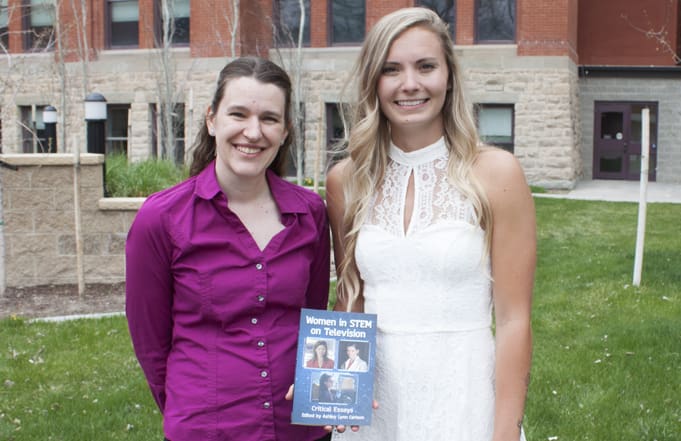May 29, 2018
Montana Western Associate English Professor, Ashley Carlson, wrote and edited a collection of critical essays titled “Women in STEM on Television,” with the assistance of two English Majors, Erin Nicholes and Hope Crowell.

Carlson explained that television has a strong influence displaying gender stereotypes, especially with the portrayal of intelligent women in science, technology, engineering, and math.
She references many popular TV shows including “Bones,” “The Big Bang Theory,” and “Criminal Minds.” These shows and the essays that analyze them in the collection are appealing to a wide range of audiences, with the goal of exploring a deeper understanding of the TV shows and their characters.
Two undergraduates had their work published with the help and encouragement from Carlson, a major accomplishment that may not have been possible without the opportunity and flexibility Experience One offers. The Montana Western Experience One program focuses on immersive learning that includes one-on-one time with professors, while students take one course at a time before moving on to the next.
Recent graduate Erin Nicholes is the author of “A Bad Case of the Feels: Emotion Versus Reason on ‘Blindspot.’”
Nicholes talks about having to choose between being feminine and being a scientist. “Blindspot” breaks down a stereotypical gender barrier for women, making Agent Patterson, the lead character in ‘Blindspot’, an inspiration for women in STEM.
Hope Crowell, also a 2018 graduate of Montana Western, is the co-author of “Achievements, Gaps, and the ‘Achievement Gap’: STEM in Children’s Programming” with Carlson.
Crowell and Carlson explore many social factors including interest in subjects, stereotypes, and exposure to role models, which directly influence the achievement gap between boys and girls in science and math.
Carlson says, “the collection demonstrates how television often reaffirms gender stereotypes that deter women from pursuing STEM professions.” Unrealistic expectations and stereotypes are often presented on TV, which can scare people away from pursuing careers in STEM, particularly women.
In the publication, Carlson emphasizes the importance of having more women in science and technology professions.
Carlson shares a powerful message on the impact of TV and the positive impacts the medium can have on encouraging engagement in the STEM fields. “The average American adult spends over thirty hours per week watching television. TV series can have a broad impact on cultural norms; when women and girls see people like themselves represented as scientists and technologists on television, they’re more likely to consider those professions.”
“Women in STEM on Television,” the spin-off of Carlson’s first edited collection, “Genius on Television,” is available from the independent publisher McFarland & Company.